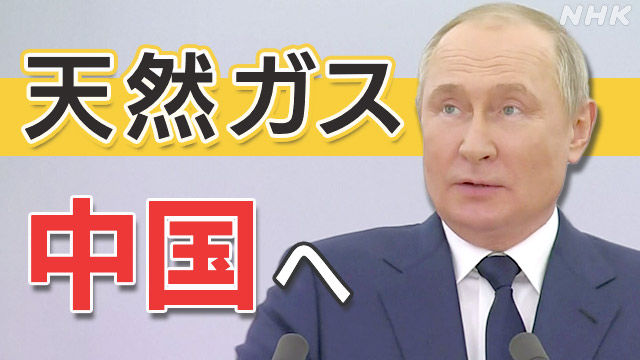As Russia continues to invade Ukraine, it is increasing supplies of natural gas to China.
Last month, East Siberia opened the largest gas field in eastern Russia, opening up a full pipeline to China.
What is the situation with natural gas in Russia?
What are Putin's goals?
A summary of the latest situation.
What is a new gas field?
On December 21, 2022, Russian government-affiliated gas company Gazprom began operating the Kovykta gas field, the largest gas field in eastern Russia, located in the Irkutsk region of Eastern Siberia.
According to Gazprom, the field has about 1.8 trillion cubic meters of extractable natural gas reserves, with plans to produce 27 billion cubic meters annually from 2026 onwards.
Prior to the ceremony, Gazprom opened its Kovykta gas field production site to Russian media, as well as Chinese media and NHK.
The site is located in an extremely cold region where the temperature can drop to minus 60 degrees Celsius in winter.
A Gazprom representative emphasized that despite the harsh environment, the project was realized with Russian technology.
The natural gas produced here is transported to China through a pipeline called "Power of Siberia".
“Power of Siberia” is a major project to send gas directly from Russia to China. 3,000 km has been fully opened.
“This is a special and memorable event for the Russian gas industry and the economy as a whole,” said Putin, who attended an online ceremony to open the Kovykta gas field.
another pipeline plan
In addition, Russia is also proceeding with plans to build a pipeline "Power of Siberia 2" that will send gas to China via Mongolia.
Construction could begin in 2024, and is expected to transport an additional 50 billion cubic meters of natural gas to China annually, according to Russian state news agency TASS.
Deputy Prime Minister Novak, who is in charge of energy affairs in the Russian government, said in an interview with state television last September (2022) that "Power of Siberia 2" is comparable to the annual transport capacity of "Nord Stream 2", which connects Russia and Germany. He said, ``It may be an alternative to Nord Stream 2,'' and expressed his willingness to develop it.
At a government meeting held on December 15, President Putin said, "We will look for more promising partners than Europe," regarding the supply of natural resources. It emphasizes cooperation and shows a bullish stance.
Europe dependent on Russian gas
Europe has been heavily dependent on Russia for energy supplies such as natural gas.
Germany, Europe's largest economy, accounted for more than 50% of its natural gas imports from Russia before Russia launched a military invasion of Ukraine, and the EU = European Union as a whole will account for about 40% by 2021. was going up
After the invasion, the EU imposed sanctions against Russia, including a ban on imports of coal and crude oil transported by sea, and has announced a policy to break away from its dependence on Russia for energy by 2030.
Meanwhile, Russia has slashed supplies of gas by Nord Stream, a natural gas pipeline to Germany, causing higher energy prices in Europe.
Russia seems to have the aim of shaking Europe, which imposes sanctions.
According to the consumer price index in the euro area such as Germany and France, energy prices have risen significantly, and from September to October last year, the price increased by more than 40% compared to the same month of the previous year for two consecutive months. have become.
Since then, the rise has slowed somewhat, but it has become a burden for households and businesses.
When I interviewed citizens in Berlin, the capital of Germany, they said, "My gas bill has tripled. I'm cutting back on everything except utility bills." I am also worried about securing natural gas in the future.”
Expert ``Collaboration between Russia, China, India, etc. is strengthening''
Yuki Hasegawa, a researcher at the Ministry of Defense's National Institute for Defense Studies, who is familiar with Russia's security, expressed the view that Russia's economic and energy strategy after the military invasion of Ukraine is "trying to survive in a world different from the West." .
He also said, "Russia's economic ties with China, India, Turkey, Middle Eastern countries, etc. have grown stronger since the military invasion, and it is necessary to keep in mind that Western sanctions have certain limits." pointed out.
Regarding the situation where Russia is expanding its gas supply to China, he said, "In response to the invasion, China has shown an attitude of keeping a little distance from Russia, but we are working to deepen cooperative ties in energy. Russia is increasingly dependent on China economically and militarily."
On top of that, he said, ``If the energy cooperative relationship with China and other countries deepens, it may help Russia secure war expenses and procure various goods.'' Nonetheless, he pointed out that Russia could be a source of funding for continued military aggression.
(Nao Takatsuka, Vladivostok Branch, Kenichi Tanaka, Berlin Branch, Yusuke Goto, International Department)

